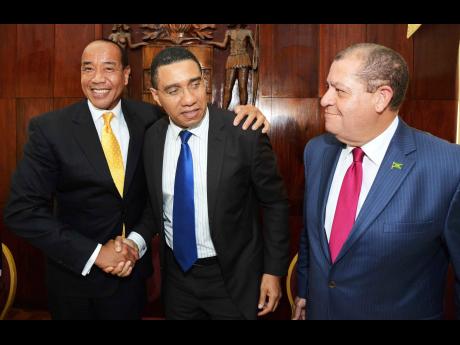'Society now understands government has to be frugal'
It has taken the International Monetary Fund (IMF) to get the Jamaican society to understand that Government has to be economical rather than recklessly extravagant or wasteful in the use of resources, according to Prime Minister Andrew Holness.
"It is incredible - and I've always maintained this - that it has taken the IMF for the society as a whole to come to the understanding that Government cannot be profligate, that Government has to be frugal and that Government has to work towards a balanced Budget. That we have to reckon with our borrowing; that we can't continue to develop on debt, we have to develop on growth," he said.
He said fiscal policy in the last 10 years has started to get priority attention, "where the Ministry of Finance, by virtue of what has happened - going through a recession, the reintroduction of the IMF and two debt exchanges - we have had to take on to the legislative agenda, first the fiscal responsibility framework and then that morphed into fiscal rules; and then the social and civil society support for Government maintaining fiscal discipline."
Holness, speaking at the launch of the Government's economic growth council at Jamaica House last week, said "that is a watershed in Jamaica's economic development, in our political economy it is a watershed. But if you rely wholly and solely on fiscal policy it will take you so far; it is not the silver bullet in itself."
He said that as the Government develops fiscal policy, parallel to that must be the development of growth policy.
"And this is the area in which many Caribbean countries don't pay too much attention. It is not settled as to what are the set of policy initiatives that need to be deployed in a country to achieve growth," the prime minister contended.
"And so we take the view that we have to start this process of institutionalising economic growth as a settled policy that Government will pursue. And more than that, we have to build the social support around it so that Government remains accountable," he added.
POLICY DRIFT
According to Holness, "It is not that we don't know what to do. If you examine the economic history of Jamaica, we produce some of the brightest minds that we export to other countries [and] who work at the highest levels of the multilateral institutions".
Rather, "our failure has always been something that has been coined in diplomatic language as 'policy drift'. So we start off saying we are going to do X and then, all of a sudden, we end up drifting till we are at Y," said the prime minister.
"And the drift isn't always the fault of the politicians. Sometimes it is what the electorate allows or demands. So there is a disconnect between what is good, what is necessary and the short-term desires sometimes, which lead to populist policies and Government responding to signals that sometimes lead us into what I would call a vicious cycle. And I term that to be the politics of poverty," he argued.
Holness said what Jamaica really need is a virtual cycle of growth. "And that means we have to bring in the electorate to understand why it is that we have to do the things that we are doing. But to also let the electorate understand that it is not the intention of Government that you should suffer while we achieve economic growth."
PARTNERSHIP
He explained that "it is a partnership where we work together and that the benefits of the partnership will be shared equitably and fairly. That you have a role to play in growth, and we are bringing you in at the table. This is about every single Jamaican participating in that dream to 'step up inna life'."
The economic growth council, which will be headed by chairman of the NCB Group of Companies, Michael Lee-Chin, will be appointed for four years initially and will comprise no more than 12 members.
The council will advise the Government on proposed initiatives that are expected to yield economic growth.
Lee-Chin and the chairman of the planning committee of the growth council are the only two members named so far.

